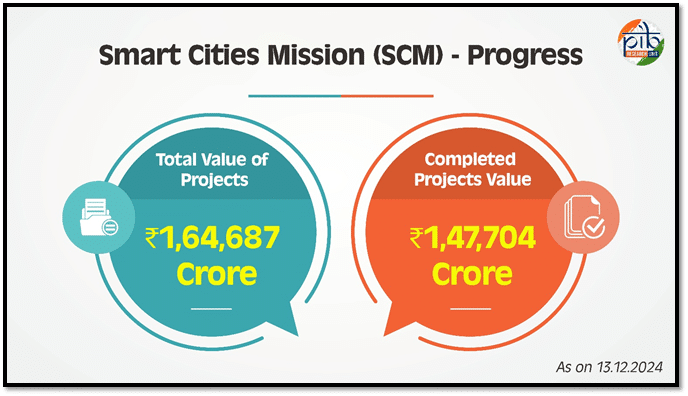Transforming Urban India: The Smart Cities Mission

The Smart Cities Mission (SCM) is a transformative initiative launched by the Indian government to enhance the quality of life in urban areas. Launched on June 25, 2015, by Prime Minister Narendra Modi, the mission aims to create 100 smart cities across the country. The focus is on sustainable and inclusive urban development, ensuring that cities are economically vibrant and environmentally friendly. The mission targets key areas such as infrastructure, governance, and social development, striving to improve urban living conditions for all citizens.
As of now, significant progress has been made. Out of 8,075 projects, 7,380 have been completed, with a total investment of ₹1,47,704 crore. These projects are designed to create smarter, more livable urban spaces. The SCM is not just about technology; it is about creating cities that are adaptable to the needs of their residents. By focusing on efficient services and robust infrastructure, the mission aims to set a benchmark for urban development in India.
Key Features of the Smart Cities Mission
The Smart Cities Mission is built on two primary approaches: Area-Based Development (ABD) and Pan-City Projects. The ABD approach allows each of the 100 selected cities to identify specific areas for targeted interventions. These areas are chosen through citizen participation, ensuring that the developments reflect the needs and desires of the local population. The goal is to create replicable models that can be applied to other parts of the city.
In addition to ABD, each city is required to implement Pan-City Projects, which leverage technology to enhance urban living. These projects focus on integrating smart solutions across various sectors, including transportation, waste management, and public safety. The mission also emphasizes the establishment of Special Purpose Vehicles (SPVs) for effective program implementation. This structure promotes competitive federalism and encourages citizen engagement in the development process.
The SCM is not just about building infrastructure; it is about fostering a sense of community and inclusivity. By involving citizens in decision-making, the mission aims to create urban spaces that cater to the diverse needs of all residents.
Achievements and Milestones
The Smart Cities Mission has achieved remarkable milestones since its inception. As of December 13, 2024, approximately 91% of the total projects have been successfully completed. This reflects a significant transformation in urban landscapes across India. Some notable achievements include the development of over 17,026 kilometers of water supply systems monitored through SCADA technology, which has effectively reduced non-revenue water and leakages.
In solid waste management, more than 66 cities have adopted advanced technologies to enhance efficiency. This includes the use of RFID-enabled vehicles for automatic location tracking, improving the overall management of waste collection. Furthermore, the mission has seen the construction of over 1,740 kilometers of smart roads and 713 kilometers of cycle tracks, promoting sustainable mobility options.
In the education sector, the initiative has led to the establishment of 9,433 smart classrooms and 41 digital libraries, enhancing learning opportunities for students. These achievements demonstrate the SCM’s commitment to improving various aspects of urban life, making cities more livable and sustainable.
Adapting to Challenges and Future Strategies
The Smart Cities Mission has shown resilience by adapting to emerging challenges. In response to the COVID-19 pandemic, initiatives like ‘Cycles4Change’ and ‘Streets4People’ were launched to promote open spaces for active living. These projects aim to create safer environments for residents, encouraging outdoor activities while ensuring social distancing.
Moreover, the mission has introduced programs like ‘Transport4All’ to support public transport startups and improve food hygiene through the ‘EatSmart Cities’ initiative. These efforts reflect the mission’s commitment to inclusivity and addressing the needs of vulnerable groups.
Looking ahead, the Smart Cities Mission aims to continue its focus on local area development while leveraging technology for smart outcomes. The approach includes retrofitting existing areas, developing new greenfield projects, and implementing smart solutions across cities. Each city’s proposal must incorporate area-based models along with a Pan-city feature to ensure comprehensive benefits for all residents.
Observer Voice is the one stop site for National, International news, Sports, Editor’s Choice, Art/culture contents, Quotes and much more. We also cover historical contents. Historical contents includes World History, Indian History, and what happened today. The website also covers Entertainment across the India and World.
Follow Us on Twitter, Instagram, Facebook, & LinkedIn

